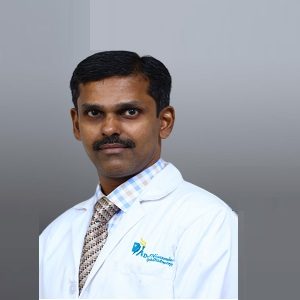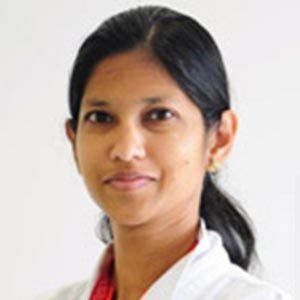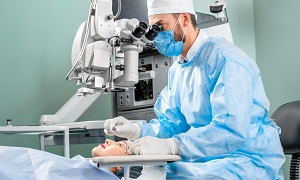Best Doctors in India for Phacoemulsification
- Opthalmologist, Chennai, India
- Over 26 years’ experience
Profile Highlights:
- Dr. Pratik Ranjan Sen is a specialist in Ophthalmology and serves as an Ophthalmologist – Consultant at Apollo Hospitals, Chennai.
- He has performed over 8000 Retinal detachment and other Vitreo retinal disorder surgeries.
- Dr. Pratik Ranjan Sen considers his profession a mission and is dedicated to his work. Due to this, he has gained enough trust and recommendations from his patients.
- Ophthalmologist, Chennai, India
- Over 21 years’ experience
Profile Highlights:
- Dr. Viswanathan P is one of the best eye surgeons in India having an overall experience of 21 years.
- He is a qualified doctor from the Tamil Nadu University of India and possesses a degree in MBBS and MS.
- One can visit him for routine eye check-ups or retina examinations and services like eye surgery, retina surgery, cataract surgery, etc.
- Ophthalmologist, Gurugram, India
- Over 13 years’ experience
Profile Highlights:
- Dr. Svati Bansal is an esteemed consultant and practitioner of ophthalmology in Gurugram.
- Her specialty lies in orbit and oculoplasty, ocular oncology, ocular trauma, and neuro-ophthalmology.
- She has fellowships in neuro-ophthalmology and ocular motility, oculoplasty, and facial aesthetics, and ocular oculoplastic and ocular oncology.
Best Hospitals in India for Phacoemulsification
Pushpawati Singhania Hospital & Research Institute, New Delhi
- City: New Delhi, India
Hospital Highlights:
- Established in 1996, Pushpawati Singhania Research Institute is one of the top hospitals in the NCR region, as well as one of the top facilities in India for gastroenterology. The hospital is one of South Asia’s first institutes in medical and surgical treatment for diseases related to digestion.
- The hospital is equipped with state-of-the art facilities coupled with the latest equipment as well as renowned consultants from various parts of India as well as other parts of the world.
W Pratiksha Hospital, Gurgaon
- City: Gurugram, India
Hospital Highlights:
- W Pratiksha Hospital, Gurugram, is one of the best hospitals in the NCR region. It is also a top hospital in India for IVF. Since its inception, the hospital has performed over 5500 successful IVFs. The hospital also specializes in gynecology.
- With over 20 years of experience in providing quality healthcare, the hospital is known as one of the most trusted and valued health providers in India.
- Equipped with world-class medical facilities and advanced technology, the hospital’s doctors and clinicians also have a track record of delivering excellent results. The hospital is also known for focusing on preventive well-being as much as on curative treatment.
- The hospital has earned the trust of its patients, by providing the best available treatments at affordable costs.
Narayana Superspeciality Hospital, Gurugram
- City: Gurugram, India
Hospital Highlights:
- Situated near DLF Cyber City, Gurugram, Narayana Superspecialty Hospital is one of the top medical facilities in the Delhi NCR region, catering to the needs of the people. Known for its commitment to quality medical care and patient service, the hospital is a state-of-the-art facility with planned and well-equipped sections, which includes a spacious OPD area as well as comfortable patient rooms.
- It is the closest super-specialty hospital from Indira Gandhi International Airport towards Gurugram, and also the nearest super specialty hospital from DLF Cyber City. It is also close to major residential areas in Gurugram.
- It is part of the renowned Narayana Health Group. Established in 2000, by Dr. Devi Shetty, a renowned cardiac surgeon, it has grown to be one fo India’s leading healthcare groups.
Sir Ganga Ram Hospital, New Delhi
- City: New Delhi, India
Hospital Highlights:
- Sir Ganga Ram Hospital, New Delhi is known to provide the latest medical procedures with the latest technology in all of its units.
- The hospital has a team of reputed doctors, nurses, and healthcare professionals that ensure that patients receive quality care at affordable costs.
- Staffed with a team of highly qualified doctors, dedicated nurses, and paramedical and non-medical staff, the hospital aims to lead in healthcare delivery, medical education, training, and research.
- As per the vision of the founder, the hospital also provides free treatment to the economically weaker sections of society.
- Sir Ganga Ram Hospital also provides training to young doctors under the Diplomate in National Board(DNB) program. The DNB program at the hospital was started in 1984 and it is known for currently running the maximum number of DNB specialties in the country. It also has the distinction of having the first bone bank in India.
KIMS Hospital, Hyderabad
- City: Hyderabad, India
Hospital Highlights:
- KIMS Hospital (a brand name of Krishna Institute of Medical Sciences) is one of the largest and best multi-speciality hospitals in Hyderabad. The hospital provides various treatments to an enormous number of patients.
- The hospital has a capacity of more than 3000 beds. KIMS Hospitals offers different healthcare services in more than 25 specialities and super specialities.
- The hospital is equipped with modern medical equipment and technology. It has robotic equipment to provide minimal invasive techniques for patients.
- The hospital is aimed at providing world-class healthcare facilities and services at an affordable cost for patients.
- The various specialities and departments of the hospital include neurosciences, gastroenterology & hepatology, robotic science, reproductive sciences, dental science, oncological sciences, organ transplantation, heart and lung transplantation and mother and child care.
Fortis Hospital, Shalimar Bagh
- City: New Delhi, India
Hospital Highlights:
- Fortis Hospital in Shalimar Bagh is a multi-super specialty hospital that strives to provide world-class patient care by leaving no stone unturned.
- Fortis, Shalimar Bagh, with 262 beds and a 7.34-acre footprint, provides the best level of medical care through its team of doctors, nurses, technicians, and management professionals.
Reliance Hospital, Mumbai
- City: Mumbai, India
Hospital Highlights:
- Reliance Hospital is one of the best super-specialty care hospitals in Navi Mumbai.
- The main purpose of this hospital is to become a trustworthy place for the best health and hope for society. The hospital is well connected to the suburbs of Mumbai and Navi Mumbai.
- The hospital has various specialty departments, viz., Accident & Emergency, Anesthesiology, Dental Services, Dermatology, Diabetology, Dietetics Nutrition, Endocrinology, ENT, Gastroenterology, General Surgery, Gynaecology And Obstetrics, Hepato Pancreato Biliary Surgery, Infectious Disease, Internal Medicine, Interventional Radiology, Laboratory Medicine, Minimal Access Laparoscopic Surgery, Nephrology, Neurosciences, Opthalmology, Orthopaedics, Paediatrics, Pain Management Palliative Care, Physical Medicine Rehabilitation, Plastic And Reconstructive Surgery, Psychiatry, Pulmonary Medicine, Radiology, Rheumatology, Transplant, Urology Andrology, Vascular Surgery
Lilavati Hospital & Research Centre, Mumbai
- City: Mumbai, India
Hospital Highlights:
- Lilavati Hospital & Research Centre is India’s premier multi-speciality tertiary care hospital and has been recognised as a global medical excellence centre.
- Lilavati Hospital & Research Centre has built an unrivalled level of trust with its patients over the years, thanks to a solid foundation that comprises cutting-edge facilities, the best medical competence, research, education, and charity endeavours.
- The hospital is quite proud of the fact that it now serves patients from all kinds of backgrounds, not just from the United States but from all around the world.
- The hospital has a total of 323 beds, one of the largest Intensive Care Units (ICUs), 12 Operation Theatres with modern amenities, over 300 consultants, and almost 1,800 personnel.
Venkateshwar Hospital, Dwarka, New Delhi
- City: New Delhi, India
Hospital Highlights:
- State-of-the-art technology and devoted healthcare professionals have been brought together under one roof at Venkateshwar Hospital to provide genuine medical care. The hospital’s professionals work together as a team to deliver the best possible treatment to their patients, using the most sophisticated equipment and information technology.
- Venkateshwar Hospital’s mission is to attain global excellence in healthcare by employing evidence-based, ethical clinical practices and cutting-edge technology by a team of highly skilled experts.
Phacoemulsification
Phacoemulsification is generally the most common form of cataract surgery performed. Cataract surgery is meant to restore vision for people whose vision becomes cloudy from cataracts, a clouding that forms on the lens of the eyes.
As you age, cataracts are more likely to form. In the first stages, people generally notice slight cloudiness as it affects only a small part of the lens. However, as it grows, it can block more light which makes the vision even cloudier.
Purpose
People, who want to get their cataracts problem treated, are considered candidates for this procedure. Cataracts can not only inflict you with blurry vision but can also lead to other problems, which include turning your eyesight sensitive to the glare from lights. This can turn your daily-life activities into a huge problem.
As cataracts develop and worsen, you should notice these common symptoms:
- gradual onset of blurry vision
- frequent changes in the prescription for corrective lenses
- poor central vision
- near vision improvement to the point where you no longer need reading glasses
- increased glare from lights
- poor vision in sunlight
People can choose the surgery due to other problems, as cataracts can be a hindrance in the treatment of other problems such as age-related macular degeneration, diabetic eye problems, or any other common eye diseases.
You can have cataracts for years before the vision is impaired enough to warrant surgery. Generally, eye doctors suggest eyeglasses to help improve the vision temporarily, but as the lens grows cloudier, vision will deteriorate.
Cataracts grow faster in younger people or people having diabetics. Therefore, doctors are likely to recommend surgery more quickly in such cases. If the patient suffers from other eye ailments, such as macular degeneration, then it is more likely that surgery is going to be recommended more quickly. Surgery becomes necessary when symptoms worsen to a point that everyday activities become a problem.
Preparation
First, a complete ocular exam is performed, so that the severity of the cataract can be determined and what type of surgery the patient will receive. For some denser cataracts, an older method named extracapsular extraction is preferred.
After the diagnostic exams are performed, if cataracts are detected in both the eyes, they will be treated separately.
Before the surgery, the overall health of the patient is also considered. A physical examination might be recommended by surgeons before surgery.
Patients are generally advised not to eat or drink anything after midnight on the day of the surgery. Patients also need to disclose all medications so that they are able to determine if they need to be discontinued. The surgeon might also recommend you to begin using antibiotic drops before your surgery, as this can limit the chance of infection.
The surgery is performed on an outpatient basis, and therefore it is important for patients to arrange for someone to take them home after the procedure.
Procedure
During the procedure, the doctor might use local anesthesia, which is injected around the eye, or topical anesthesia, numbing drops that are inserted into the eye.
First, the surgeon will make a tiny incision at the edge of your cornea. Then he/she creates an opening in the membrane that surrounds your lens. A small ultrasonic probe is next inserted, breaking up the cloudy lens into small fragments. Then the instruments vibrate at ultrasonic speed to chop and dissolve the lens material into tiny fragments. Then the fragments are suctioned out of the capsule by an attachment on the probe tip.
After the lens particles are removed, an intraocular lens implant, which is known commonly as IOL, is implanted and positioned into the lens’s natural capsule. It is inserted through the small corneal incision through a hollowed-out tube. Once the lens is pushed through, it unfolds and is positioned in place.
The procedure is generally performed on an outpatient basis and doesn’t require a hospital stay.
After the procedure
The incision which is made in the cornea generally doesn’t require any stitches and is self-sealing. Generally, post-operative eye drops are prescribed and they usually consist of antibiotics, steroids as well as a non-steroidal anti-inflammatory medication. These drops help in reducing inflammation and preventing infection. The antibiotic can be discontinued in around 7-10 days.
Most patients are able to experience an improvement in their vision almost immediately after the procedure. Though for others it steadily improves over 4-5 weeks. The majority of patients are able to restore their visual acuity after the procedure, and many of them also no longer require the use of glasses or contact lenses.
Risks
Though complications are unlikely, they might occur. Patients might experience spontaneous bleeding from the wound as well as recurrent inflammation after the surgery.
For some people, flashing, floaters and double vision might also occur a few weeks after the surgery. If you experience them, you should notify your surgeon immediately of any symptoms. Some are easily treatable, while some such as floaters might be a sign of a retinal detachment. The retina can become detached by the surgery if there is a weakness in the retina at the time of the surgery. However, this complication may not occur for weeks and months.
Another potential complication is infection. The most serious infection is endophthalmitis, an infection of the eyeball, although it is quite uncommon.
Glaucoma is also one of the possible complications, and in some rare cases, blindness. It is best that you discuss all risks and possible complications with your surgeon before you make the decision to undergo the procedure.














